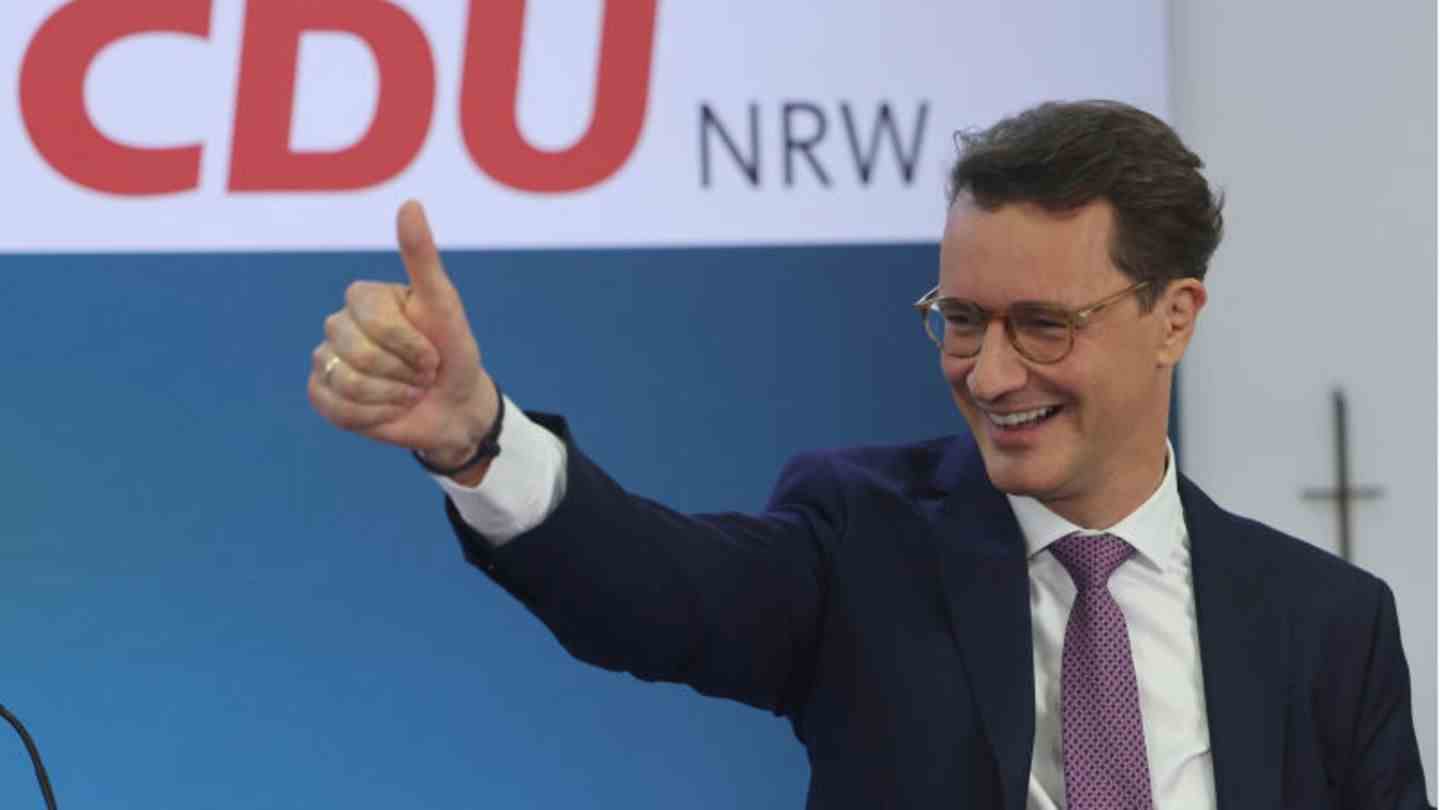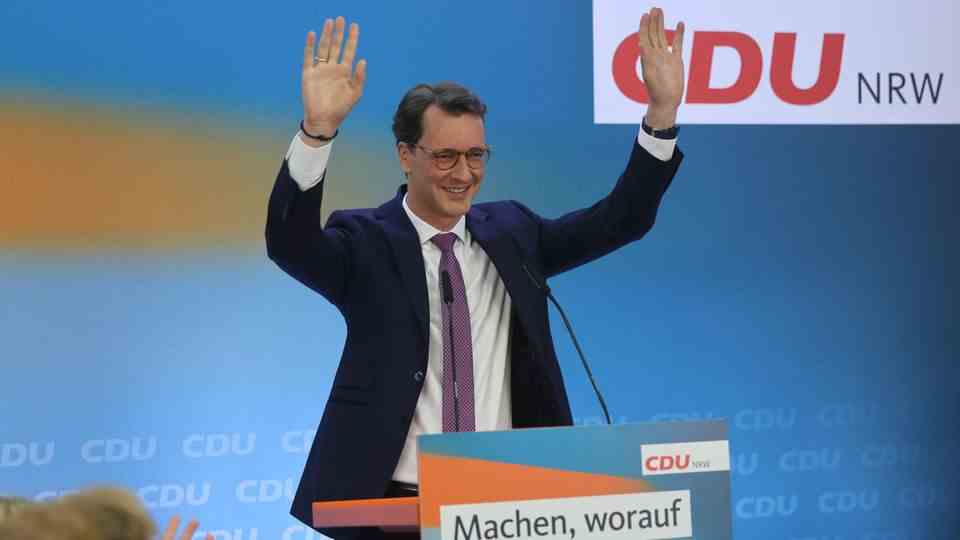In the state elections in North Rhine-Westphalia, the CDU triumphs while the SPD falls. The Greens, on the other hand, achieved a record result – and could play a decisive role in forming a government.
North Rhine-Westphalia has voted – and a clear election victory for the CDU is emerging. That wasn’t necessarily to be expected. The Union is about nine percentage points ahead of the SPD. A clear gap, much larger than the last surveys suggested.
The winner of the evening is Hendrik Wüst, Prime Minister of North Rhine-Westphalia for seven months. He led his party through the election campaign in a sympathetic and confident manner, without expecting too much political content from the people in the Rhine and Ruhr. Apparently that worked well. There is much to suggest that Wüst will remain head of government in the most populous federal state. It would also be enough for a traffic light coalition, theoretically. Four initial insights from the state elections in North Rhine-Westphalia:
The CDU won this election – a success for Hendrik Wüst
Last fall, Hendrik Wüst rose from Minister of Transport to Prime Minister. That was more of a coincidence. Because Armin Laschet had already decided before the federal election that he would definitely switch to federal politics, the CDU needed a successor. And because the head of government of North Rhine-Westphalia needs a mandate in the state parliament, the selection was manageable: not many ministers in Laschet’s cabinet were also in the state parliament. Wüst was one of the few – and got the job.
He made good use of the seven months that followed. Wüst, 46, lawyer, Munsterlander and young father, had to manage crisis after crisis. First Corona came back, then the war in Europe, and with it concerns about jobs and inflation. Wüst has managed to become better known in a short time. And he is apparently well received by the CDU party base on the Rhine, Ruhr and Lippe.
Voter turnout in NRW is extraordinarily low in this election. It is all the more noticeable who was able to reach and mobilize their own base. Wüst’s strategy consisted of three messages: secure jobs, good schools, internal security – with this triad he denied the short but intense election campaign. Olaf Scholz won a federal election last year with similarly simple messages.
Unlike Scholz, Wüst also had a strong second man at his side, a kind of co-lead candidate: Herbert Reul. The popular Minister of the Interior of North Rhine-Westphalia, who personally oversees every clan raid in shisha bars, was so prominent in the election campaign that in the meantime one could wonder whether the Union was still “second vote is Reul vote” on their final sprint would stick posters.
The lead of the CDU in North Rhine-Westphalia on the evening of the election is so clear that Wüst, Reul and Co have no difficulty deriving a clear government mandate from it. Wüst got a better result than Armin Laschet five years ago, a confirmation of the CDU’s government policy. Wanting to forge another alliance against him will not be easy to mediate.
From football fans and mustard lovers: These are the top candidates of choice in North Rhine-Westphalia
5 images
The Greens celebrate their super result – and become the decisive party
The second winner that evening is Mona Neubaur, the Green Party’s top candidate. According to the first projections, she gives her party a dream result of around 18 percent, the best in the history of the Greens in North Rhine-Westphalia, three times as much as in the 2017 election.
Even after a few weeks of campaigning, Neubaur is still largely unknown in NRW. In her performances, she relied on prominent support from federal politics. Foreign Minister Annalena Baerbock brought the successes of the Greens in government to market places in North Rhine-Westphalia. Now the Düsseldorf result is also strengthening the traffic light greens in Berlin.
Neubaur and the Greens are now deciding who will become prime minister. As simple as that sounds, it could be difficult – or at least it looks like it. In the run-up to the election, Neubaur always emphasized that he preferred a coalition of two. A traffic light government would therefore be rather unlikely, even if there is a majority for it. In any case, black-green is possible and now the new coalition of choice from Hendrik Wüst, who since taking office has particularly enjoyed talking in detail about the sustainable transformation of the industrial state of North Rhine-Westphalia. Neubaur would not have any major problems with the CDU as a partner either, it belongs to the bourgeois wing of the Greens.
It is more likely: strengthened by their grandiose result, the Greens of the CDU wrestle some negotiating success before they elect Hendrik Wüst as Prime Minister. And the people in NRW will hear a lot about “reconciling ecology and economy” for five years.
The SPD brings in the worst result – and still hopes
You can make it short: The SPD has brought in the worst result in its history in NRW, less than 27 percent according to the first projections. It lands far behind the CDU. And Thomas Kutschaty, the Wüst challenger, can hardly claim to become the new Prime Minister of North Rhine-Westphalia. In fact. They will try anyway. The Social Democrats had already announced that before the election, Kuchaty said you don’t have to get the most votes to form a government. It still looked like it was going to be tight. But it wasn’t.
For seven years, from 2010 to 2017, Kuchaty was Minister of Justice in Hannelore Kraft’s red-green state government. If you will, he has more government experience than Hendrik Wüst, who only has five years to show for it. Thing is, it didn’t help him. During the election campaign, Kuchaty presented himself as a likeable caretaker and listener. He completed a similar number of appointments as Wüst and became better known. But he lacked the presence of an incumbent.
Kuschaty belongs to the left wing of the SPD, he wasn’t always a fan of Olaf Scholz. In the election campaign, however, he suddenly tried to score points with his closeness to the chancellor. He could always call him, said Kuchaty. And that was not very convincing as an election argument, because Wüst, as chairman of the prime ministers, had recently been seen so often on television next to Scholz.
Kuchaty will probably try to get in touch with the Greens and Liberals. But what should come of it that is substantial, now that the overall result in NRW makes the traffic light in Berlin appear even less than a worthwhile model. Green is the color of the successful, once again, as in the past weeks and months of Ukraine – and energy policy. Red and yellow fall off significantly.
The liberals are being punished – this increases the pressure on the federal FDP
It is a particularly bitter evening for the FDP. The Liberals governed with the CDU for five years. They enjoyed their freedom under Armin Laschet, but didn’t really warm to Wüst. According to their taste, the newcomer wants to shine too much himself – the Munsterlander obviously doesn’t like the “jonne could”, as they say. In the Rhineland, on the other hand, where Vice Prime Minister Joachim Stamp of the FDP lives, this is a matter of state.
The election result now proves Wüst right. He cannibalized the FDP and was able to win middle-class swing voters over to the CDU. And the liberals can obviously be happy that they just made it back into the state parliament. The government was seen by both parties as a successful cooperation. But the Union was extremely successful in selling the FDP’s wealth of ideas as its own achievement – and the FDP, in turn, had little to counter it.
You can find various reasons for the poor performance – and it is best to start with national politics. Five years ago, a certain Christian Lindner ran as the top candidate in North Rhine-Westphalia. The success of the FDP with 12.6 percent at that time was primarily a Lindner success. Stamp has certainly had some successes as a minister, and it is believed that migration policy in particular is a deeply personal concern of his. But his performances did not match the Lindner campaign of the time, which had won over voters outside the classical liberal milieu.
But despite the special state-political circumstances, the result is not without consequences for the federal FDP in Berlin. You don’t need a lot of imagination to imagine the questions that Christian Lindner is now asking. Is this the first acknowledgment from the liberal core electorate for the traffic light? For too many trickery in the federal budget?
You can ask these questions, but they’re not necessarily fair. Because so far, the FDP has often been accused of the opposite: that it still represents too much of the purely liberal doctrine in times of change, for example with the debt brake. Or that their understanding of freedom determines the corona policy of the entire federal government. The liberals were therefore more likely to be the winners of the traffic light. The polls are also stable.
So there is a lot to be said for looking for the reasons in state politics. But that’s the way it is, in the evening and in the aftermath of this “small federal election”: What happens here has consequences beyond Düsseldorf. And Christian Lindner will have to find answers quickly. Otherwise the calm in the FDP will be over.


